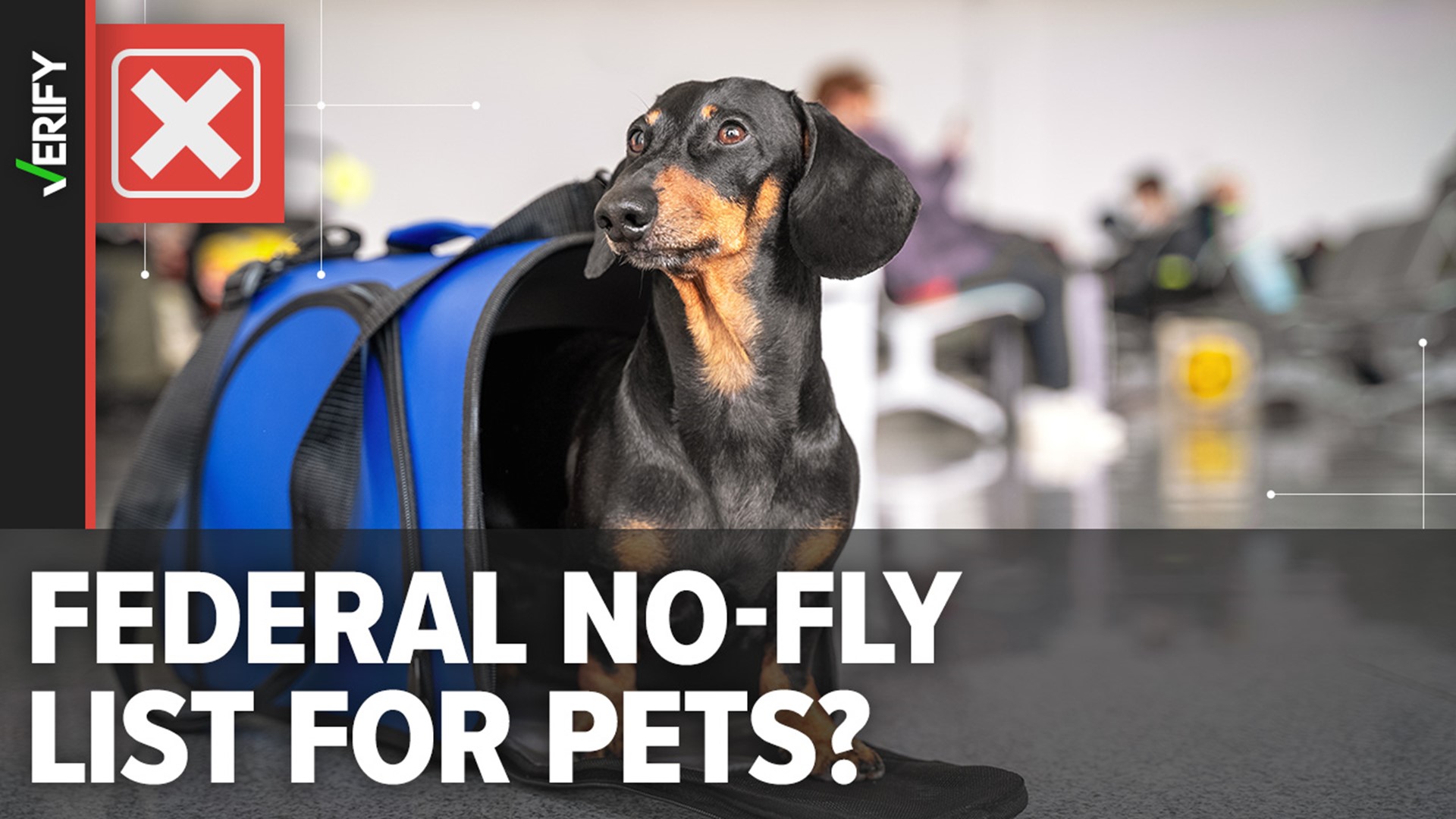Traveling can be stressful. Traveling with a pet, even more so.
Recent articles in the Wall Street Journal and the New York Post featured travelers who believed their dogs had been put on a no-fly list for pets after their dogs weren’t allowed to board flights.
THE QUESTION
Is there a federal no-fly list for pets?
THE SOURCES
THE ANSWER
No, there is not a federal no-fly list for pets. However, individual airlines are legally allowed to deny a pet from boarding a plane, unless it’s a service animal.
WHAT WE FOUND
While airlines are required to allow service animals on their flights, they have the right to deny other animals from boarding a plane.
The Federal Aviation Administration (FAA) allows each airline to decide if they allow pets in the cabin, an FAA spokesperson said. If an airline does let pets in the cabin, the pet carrier must meet FAA carry-on baggage requirements.
Any pet that flies in the cabin must therefore be small enough to fit into an appropriately sized container. Any larger pet would have to fly in the cargo hold, should an airline allow it.
Other than these few rules, each airline is free to set its own policy for pets, the Department of Transportation (DOT) says.
VERIFY reached out to each of the seven largest U.S. airlines to ask if they have an internal “no-fly list” for individual pets. Southwest confirmed it does not have a formal no-fly list for pets. United declined to comment. American, Delta, Alaska, Spirit and JetBlue did not reply by publishing time.
Pets in the cabin
All of the seven largest U.S. airlines — American, Delta, United, Southwest, Alaska, Spirit and JetBlue — at a minimum allow small cats and dogs to fly as carry-on. Delta, Alaska and Spirit allow household birds. Alaska and Spirit allow domesticated rabbits, as well.
Pets have to meet health, vaccination and age requirements set by the airline. And even if a pet is able to meet all of the above requirements, an airline can still prevent a pet from boarding at its own discretion.
Alaska, for example, says that pets with “offensive odors or those that create a noise disturbance” must travel in the plane’s cargo compartment.
Southwest says a pet that shows “disruptive behavior” may be denied boarding. Disruptive behavior can include scratching, excessive whining, barking, growling, biting, lunging or the pet relieving itself in the gate area.
Spirit warns that your pet will be removed if it “becomes offensive or causes a disturbance prior to leaving the gate.”
United’s contract of carriage says that a pet must be “harmless, inoffensive, odorless and require no attention during transit.” The airline says it “reserves the right to refuse carriage of animals in cabin at any time.”
Pets in cargo hold
That discretion extends to larger pets, which may have to fly in the cargo hold because they are too large to fit as carry-on in the cabin.
Just two of the seven largest U.S. airlines, Alaska and American, will allow any passenger to pay for a pet to fly in the cargo hold. Additionally, United and Delta clarify that active U.S. Military or U.S. State Department Foreign Service Offices personnel flying on permanent change of station orders are granted an exception and may also check pets among baggage in the cargo hold.
The four airlines that allow pets to fly in the cargo won’t allow certain breeds of cats and dogs in cargo. Most of these breeds are short-nosed dogs and cats.
Dog breeds usually on this list include bulldogs, pit bulls, pugs, mastiffs, shih tzus and boxers. There are just four cat breeds on each airline’s list: Burmese, Exotic Shorthair, Himalayan and Persian.
The restricted breed lists apply to both purebreds and mixed breeds and are largely the same across the airlines. You can see the full list for Delta, Alaska, American and United at these links.
The reason short-nosed breeds are often banned from flying cargo by airlines is because these breeds, which are prone to respiratory problems, are particularly sensitive to changes in air quality and temperature, which can occur in the cargo hold of an airplane, according to the American Veterinary Medical Association (AVMA). Short-nosed breeds have historically been more likely to die while traveling in cargo than other breeds.
American Airlines also notes that it doesn’t allow “historically aggressive breeds” to travel on their planes for safety reasons.
Delta says restricted breeds will not be allowed to fly cargo “at all times, regardless of age, weight, or temperature limits.”
However, even if your dog or cat isn’t one of these breeds, it may still be denied boarding because of other factors. American says it will only transport warm-blooded animals when ground temperatures are between 45 and 85 degrees Fahrenheit. It will not let pets travel in the cargo compartment if the temperature is higher than 85 degrees, but it will let a pet fly if the temperature is between 20 and 44 degrees so long as the passenger has a note from a vet.
Cold-blooded animals are exempt from these temperature rules. American says to prepare those animals with heat or cold packs as needed.
If you have a pet other than a cat or a dog, you should check with the airline to see if the pet is allowed. Generally, airlines that let pets travel in the cargo compartment have fewer restrictions than they do for carry-on pets. Alaska, for example, allows cats, dogs, ferrets, guinea pigs, hamsters, household birds, non-poisonous reptiles, pot-bellied pigs, rabbits and tropical fish to travel with the plane’s cargo.
This story is also available in Spanish / Lee este artículo también en español: No existe una lista federal de exclusión aérea para mascotas

